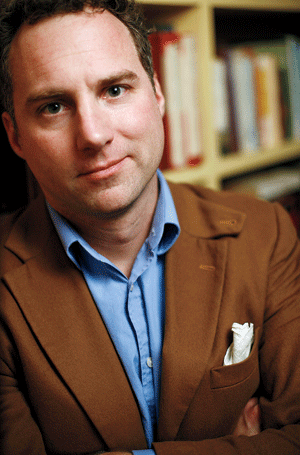Scott Gilmore, '95 BCom, was working with a UN peacekeeping mission to East Timor in 2001 when he realized the noises to which he awoke each morning weren't just annoying clatter-they were the sounds of positive economic change.
Below his window, his Timorese landlord was using the money from Scott's rent to refurbish minibuses and to hire local boys to work as drivers and mechanics. "He was soon the largest employer in the neighbourhood and provided an island of stability and prosperity, all because of my rent cheque," says Scott.

Scott Gilmore, '95 BCom
After seeing the same thing happening in Afghanistan, Scott decided to ally himself with the people who were really making a difference. In 2004, he quit his job with the Canadian foreign service and created the organization now known as Building Markets.
Was he taking a chance? Not really, says Scott. "Here's the secret about being a Canadian: the worst-case scenario in Canada is the best-case scenario in some parts of the world. With my degree from the University of Alberta and my work experience, it wasn't like I was going to starve if it didn't work out."
Scott's big idea was simple: when international missions and foreign aid agencies go to a country in desperate straits, they buy a lot of stuff-why not buy it locally and spur local recovery? With support from the UN, the World Bank and the governments of Canada and Australia, Scott's organization (initially named Peace Dividend Trust) looked into where aid money goes. Their study of 10 UN peacekeeping missions found that only five per cent of the missions' budgets entered the economies of the host countries.
As a result of Scott's work, the UN, NATO and the U.S. have all changed the way they procure goods for foreign aid. The Pentagon alone has since procured more than $1 billion in goods and services from Afghan companies, creating thousands of jobs.
To complement its aid study, Building Markets also undertook a pilot project to match Afghan entrepreneurs with procurement officers. Their original goal was to redirect $5 million into the Afghan economy. They did better. The project's total is now more than $580 million, and it has been the single largest driver of economic growth in Afghanistan since 2007.
Begun with a staff of four, Building Markets has grown to more than 120 people with offices in six countries. It has operated alongside 10 peace and humanitarian missions. In total, Scott and his team have been instrumental in creating more than 130,000 jobs and redirecting $1.1 billion into some of the world's poorest economies.
The day-to-day work of helping international procurement officers identify suitable local entrepreneurs is all as "dull as ditchwater," says Scott. But, dull or not, the change that Building Markets has brought about has caught the world's attention, resulting in a plethora of awards. Most satisfying for him, though, he says, is seeing international aid organizations begin to change the way they look at reducing poverty-eschewing handouts in favour of bringing about real economic change.
We at New Trail welcome your comments. Robust debate and criticism are encouraged, provided it is respectful. We reserve the right to reject comments, images or links that attack ethnicity, nationality, religion, gender or sexual orientation; that include offensive language, threats, spam; are fraudulent or defamatory; infringe on copyright or trademarks; and that just generally aren’t very nice. Discussion is monitored and violation of these guidelines will result in comments being disabled.